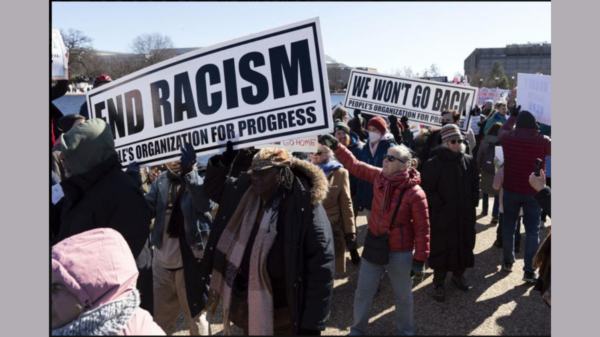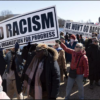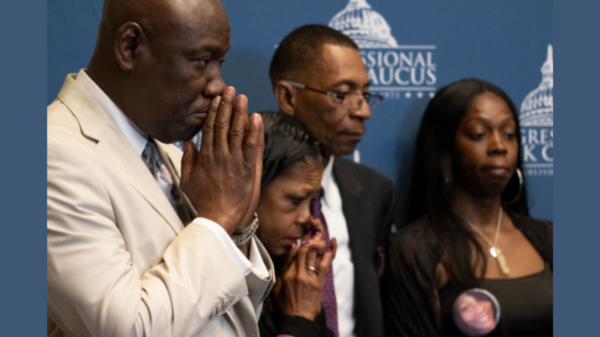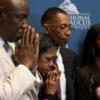By Nicole Hemmer

The current U.S. Supreme Court, stacked with right-wing justices, has in recent years dismantled many of the core civil rights programs of the past 50 years, from voting rights to affirmative action to anti-discrimination law. So it came as a surprise — and for many, a relief — when the court handed down a 5-4 decision in June, declining to gut the remaining provisions of the Voting Rights Act of 1965. Instead, the court found that Alabama’s new redistricting plan discriminated against Black voters and ordered the state legislature to redraw it.
Their new map is out, and it makes clear that the Republican-controlled legislature in Alabama has flouted the court order. Republican Gov. Kay Ivey seemed content to ignore it as well when she signed the redistricting bill (which must now go to a federal court for approval). “The Legislature knows our state, our people and our districts better than the federal courts or activist groups,” she said in a statement.
This defiance of the court by Alabama Republicans is notable not because their objection to the ruling is unique or surprising — there has been widespread frustration with the Supreme Court’s other recent rulings as well as calls to question this court’s legitimacy — but rather what they are defying. They are rejecting an order to stop discriminating against Black people. Understood in that historical vein, the action of Alabama Republicans fits into a long, sordid backstory.
For much of the Supreme Court’s history, the justices were firmly on the side of discrimination. In the years preceding the Civil War, the court decided in Dred Scott v. Sandford that no Black person could be a citizen of the United States, regardless of whether they were enslaved or free. In 1883, it struck down the federal Civil Rights Act of 1875 that had “affirmed the equality of all persons in the enjoyment of transportation facilities, in hotels and inns, and in theaters and places of public amusement.” In the 1896 case Plessy v. Ferguson, the court legally sanctioned the segregation regimes emerging across the South.
That started to change in 1938, when the court began to lay the groundwork for the civil rights jurisprudence of the mid-20th century. In a case about the regulation of adulterated milk sales, Justice Harlan Stone suggested in his majority opinion that, while the court presumed the constitutionality of many laws, there was an exception: Should the court be asked to evaluate laws that discriminated against “discrete and insular minorities,” it would apply a higher standard of judicial review. That notion of “strict scrutiny” would inform a number of the court’s rulings against racial discrimination in the years that followed, most notably in the unanimous Brown v. Board of Education decision in 1954 ordering desegregation of schools.
As the court came to embrace civil rights, racial conservatives began to defy it. Though the right found itself at odds with the court on a number of fronts in the mid-20th century, including on issues like school prayer and abortion, it was on issues of desegregation that they were the most actively in defiance of the court. Massive resistance, the sustained refusal of white Americans to comply with desegregation orders, fueled a generation of activists. By 1963, nearly a decade after the Brown decision, only 1% of Black students in the South went to school with white students. It would take federal troops and the National Guard to enforce desegregation orders in the South, and still, white legislators and parents often opted to close schools entirely rather than desegregate.
Nor was massive resistance against desegregation limited to the South. In Massachusetts, in the 1960s, the legislature ordered the desegregation of local schools; white parents and school boards resisted, leading the courts to order a busing program to aid desegregation. A large movement of white parents refused to comply with that, too.
The courts historically have faced white resistance whenever they have sided with Black civil rights. The Alabama ruling is no exception. Even in an era when the court is rapidly rolling back anti-discrimination jurisprudence — weakening the Voting Rights Act, greenlighting discrimination against LGBTQ consumers, ending affirmative action — even the mildest move to retain existing protections sparks resistance. That tells us less about the court and more about the political power — and impunity — still wielded by pro-discrimination forces, decades after the Civil Rights Movement.
In the past several years, there has been a tendency among many liberals and anti-Trump Republicans to retreat to arguments about institutions: to decry violations of norms and defend the rule of law. That understandable defense of principle, though, often fails in times of crisis, when morally bankrupt laws and authorities should be resisted, when norms act as barriers to a robust defense of democracy and civil rights.
Republicans’ defiance in Alabama is wrong not only because it violates a court order but also because it seeks to dilute Black voting in the state, part of a century-long effort to deny Black voters equal rights. As the fight over the state’s redistricting efforts continues to play out, that denial, rather than the Republicans’ defiance, should be the central focus.
Nicole Hemmer is an associate professor of history and director of the Carolyn T. and Robert M. Rogers Center for the Study of the Presidency at Vanderbilt University. She is the author of “Partisans: The Conservative Revolutionaries Who Remade American Politics in the 1990s.” CNN









You must be logged in to post a comment Login